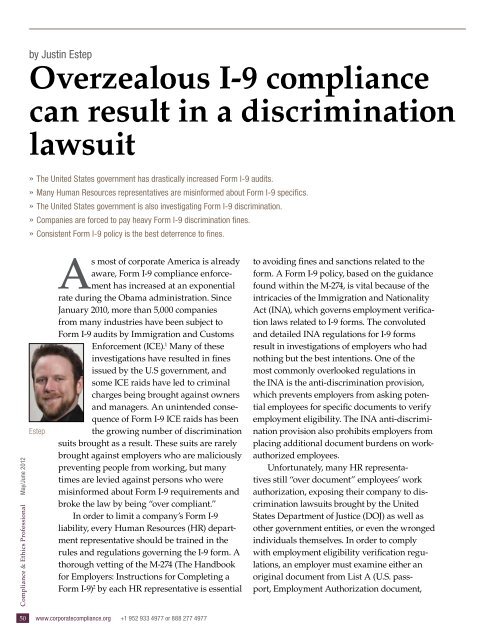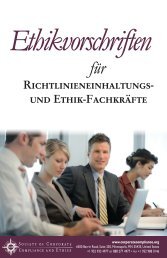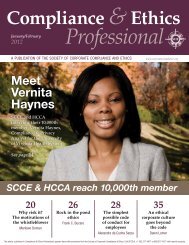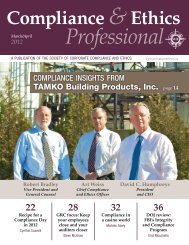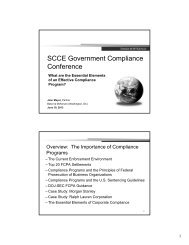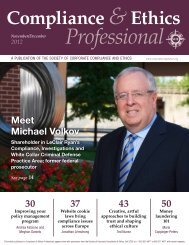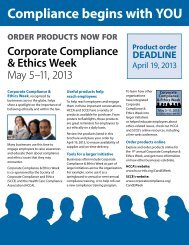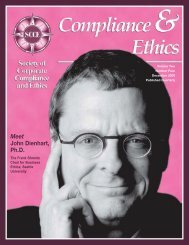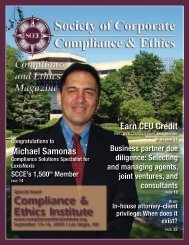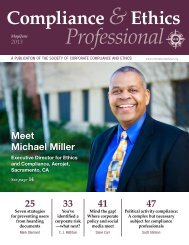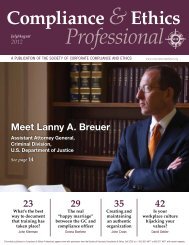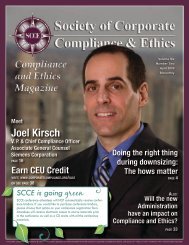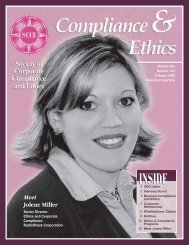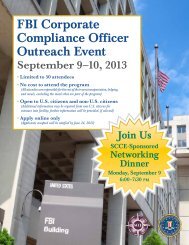y Justin EstepOverzealous I-9 compliancecan result in a discriminationlawsuit»»The United States government has drastically increased Form I-9 audits.»»Many Human Resources representatives are misinformed about Form I-9 specifics.»»The United States government is also investigating Form I-9 discrimination.»»Companies are forced to pay heavy Form I-9 discrimination fines.»»Consistent Form I-9 policy is the best deterrence to fines.<strong>Compliance</strong> & <strong>Ethics</strong> Pr<strong>of</strong>essional May/June 2012EstepAs most <strong>of</strong> corporate America is alreadyaware, Form I-9 compliance enforcementhas increased at an exponentialrate during the Obama administration. SinceJanuary 2010, more than 5,000 companiesfrom many industries have been subject toForm I-9 audits by Immigration <strong>and</strong> CustomsEnforcement (ICE). 1 Many <strong>of</strong> theseinvestigations have resulted in finesissued by the U.S government, <strong>and</strong>some ICE raids have led to criminalcharges being brought against owners<strong>and</strong> managers. An unintended consequence<strong>of</strong> Form I-9 ICE raids has beenthe growing number <strong>of</strong> discriminationsuits brought as a result. These suits are rarelybrought against employers who are maliciouslypreventing people from working, but manytimes are levied against persons who weremisinformed about Form I-9 requirements <strong>and</strong>broke the law by being “over compliant.”In order to limit a company’s Form I-9liability, every Human Resources (HR) departmentrepresentative should be trained in therules <strong>and</strong> regulations governing the I-9 form. Athorough vetting <strong>of</strong> the M-274 (The H<strong>and</strong>bookfor Employers: Instructions for Completing aForm I-9) 2 by each HR representative is essentialto avoiding fines <strong>and</strong> sanctions related to theform. A Form I-9 policy, based on the guidancefound within the M-274, is vital because <strong>of</strong> theintricacies <strong>of</strong> the Immigration <strong>and</strong> NationalityAct (INA), which governs employment verificationlaws related to I-9 forms. The convoluted<strong>and</strong> detailed INA regulations for I-9 formsresult in investigations <strong>of</strong> employers who hadnothing but the best intentions. One <strong>of</strong> themost commonly overlooked regulations inthe INA is the anti-discrimination provision,which prevents employers from asking potentialemployees for specific documents to verifyemployment eligibility. The INA anti-discriminationprovision also prohibits employers fromplacing additional document burdens on workauthorizedemployees.Unfortunately, many HR representativesstill “over document” employees’ workauthorization, exposing their company to discriminationlawsuits brought by the UnitedStates Department <strong>of</strong> Justice (DOJ) as well asother government entities, or even the wrongedindividuals themselves. In order to complywith employment eligibility verification regulations,an employer must examine either anoriginal document from List A (U.S. passport,Employment Authorization document,50 www.corporatecompliance.org +1 952 933 4977 or 888 277 4977
In the current enforcementenvironment, many employershave become concerned that theirI-9 forms may contain errors<strong>and</strong> have overcompensated bydeveloping unnecessary (<strong>and</strong>sometimes illegal) practices toimprove their I-9 compliance.Permanent Resident card, etc.) or a combination<strong>of</strong> a List B (driver’s license, voter registrationcard, etc.) <strong>and</strong> a List C document governmentissuedbirth certificate, Social Security card,etc.). The potential employee must be allowed toprovide any combination <strong>of</strong> valid documents inorder to satisfy Form I-9 requirements.In the current enforcement environment,many employers have become concerned thattheir I-9 forms may contain errors <strong>and</strong> have overcompensatedby developing unnecessary (<strong>and</strong>sometimes illegal) practices to improve their I-9compliance. As a result, some companies haveasked individuals to provide specific documentsfor employment eligibility verification, or if ac<strong>and</strong>idate is not a citizen <strong>of</strong> the United States,they have asked for more documents than arenecessary to complete a Form I-9.Generations Healthcare, a healthcareprovider based in California, was recentlyinvestigated <strong>and</strong> is now being prosecutedby the DOJ for m<strong>and</strong>ating that all non-UScitizens, who apply for employment withGenerations’ St. Francis Pavilion facility inDaly City, present extra work authorizationdocumentation, a burden that was not placedon native-born US citizens. 3Other employers, such as Garl<strong>and</strong> SalesInc., a Georgia rug manufacturer, refusedto accept sufficient employment verificationdocuments from persons <strong>of</strong> foreignorigin, <strong>and</strong> would request that naturalizedUS citizens provide their permanent residentcard, or “green card.” 4 If the employee refusedGarl<strong>and</strong>’s request, their employment <strong>of</strong>fer wasrescinded. As a result, the Office <strong>of</strong> SpecialCounsel (OSC) for Immigration Related UnfairEmployment Practices prosecuted the company<strong>and</strong> required them to pay $10,000 in backpay <strong>and</strong> civil penalties.To protect a company from an OSCemployment discrimination investigation, <strong>and</strong>to also remain vigilant in employment verificationpractices, we recommend that a company’sHR department has a detailed Form I-9 compliancepolicy with a corresponding checklist.Specifically, the policy should instruct yourHR department to provide each potentialemployee with the government approved list <strong>of</strong>acceptable Form I-9 documents. This ensuresthat no miscommunication can occur <strong>and</strong> preventsyour HR department from accidentallyrequesting specific documentation, whichcould be construed as discriminatory.Above all, a company’s Form I-9 policyshould stress consistency. Most OSC investigationstarget companies that treat foreignnationals <strong>and</strong> naturalized U.S. citizens differentlythan native born U.S. citizens. Bykeeping employment eligibility verificationprocesses consistent for each potentialemployee <strong>and</strong> keeping a well-trained HR staff,any company should be able to navigate theever choppier enforcement waters surroundingthe Form I-9. ✵1. Jordan, Miriam: “Crackdown Resumes on Firms’ Illegal Hires.” WallStreet Journal, November 15, 20112. U.S. Citizen <strong>and</strong> Immigration Services: H<strong>and</strong>book for Employers:Instructions for Completing Form I-9 Employment EligibilityVerification Form. M-274 (Rev. 06/01/11) N. Available at http://www.uscis.gov/files/form/m-274.pdf3. United States Department <strong>of</strong> Justice: “Justice DepartmentFiles Lawsuit Against California Healthcare Provider AllegingDiscrimination.” News release, September 30, 2011. Available at http://www.justice.gov/opa/pr/2011/September/11-crt-1301.html4. -United States Department <strong>of</strong> Justice. “Justice Department SettlesAllegations <strong>of</strong> Citizenship Status Discrimination <strong>and</strong> RetaliationAgainst Georgia Rug Manufacturer.” News release, December30, 2011. Available at http://www.justice.gov/opa/pr/2011/December/11-crt-1718.htmlJustin Estep is an Attorney with FosterQuan, LLP in Austin, Texas. He maybe reached at jestep@fosterquan.com.<strong>Compliance</strong> & <strong>Ethics</strong> Pr<strong>of</strong>essional May/June 2012+1 952 933 4977 or 888 277 4977 | www.corporatecompliance.org 51


